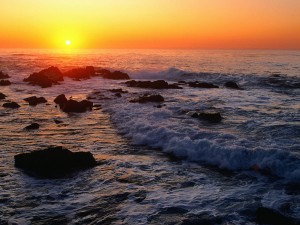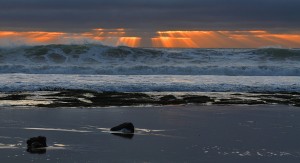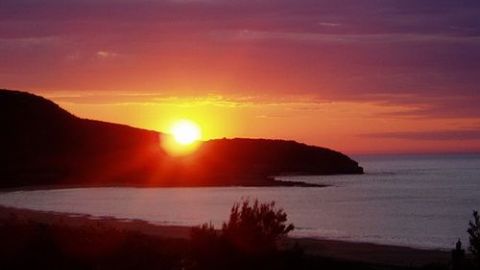When you are young, the ocean is a place of endless possibilities, great hopes and distant goals. When you are older, the ocean becomes a place of nostalgia, healing, and perhaps renewal. In actuality the ocean, literally and metaphorically, is the place from which life arose, and the place to which life returns.
 Watching a sunset over the Pacific is an altogether different experience than watching one inland. When the sun goes down over the horizon of the sea, the day makes a dramatic departure. It’s over, then and there.
Watching a sunset over the Pacific is an altogether different experience than watching one inland. When the sun goes down over the horizon of the sea, the day makes a dramatic departure. It’s over, then and there.
When the last bit of the sun sinks below the horizon, it leaves no doubt, no lingering, no time to think about later on, or dwell in the illusion of tomorrow. Today is gone, never to be again. There is a subtle sadness though not sorrow in an ocean sunset. It is a vivid passing, a death.
There is no sorrow unless there is remembrance, because sorrow is the lengthening shadow of the past that human consciousness continually casts over the present. Obviously, as memories accumulate, the shadow of sorrow grows longer as one grows older. But does it have to?
On land there is no sharp line of a horizon ending the day. On land dusk begins before sunset and envelops in a leisurely pace, and day imperceptibly blends into night. Also at the ocean, color suffuses the sky as a blazing postscript of day, whereas magenta or ochre or any of the red-shift colors are the chief characteristic of a sunset on land.
At the ocean, more than other places, the small things we think we know stand in stark contrast to the infinite well of the unknown. As humans, we live in a subconscious world of familiar associations and well-worn ideas and images about ourselves and others. It’s the accretion of thousands of years that comprises our consciousness, but the ocean has a way of finding cracks in the wall.
Standing on the edge of a continent is standing on the edge of everything you know. And to really watch the surf heave and crash on the rocks, to follow wave after wave in endless succession, is to be obliterated—if one lets go.
But one has to watch every thought and feeling as they arise, without interference, and in the very act of watching, the past and its center as ‘me’ dissolve. Then one touches the unknown, and feels the wonder and mystery of the child again.
Most people would much rather cling to the known. It’s a comfortable world after all, if a hellish one.
But if there isn’t a break in the familiar world of words, memories and experience, one drowns in the past as one grows older. It’s a danger for anyone. Indeed, humankind is drowning in its past as it prematurely ages, caught in the whirlpool of time.
Knowledge is essential, but the known is the superfluous accretion of experience, and it’s neither scientific nor practical. In an attentively silent mind, both true and false forms of knowledge give way. In the ensuing stillness, there is direct perception in the present, the perpetual moment of creation.
As the light fades, I sit against some dark rocks as the swells curl and crash in front of me. A steady breeze cools my skin. A few solitary people trundle by, not looking around, their eyes apparently fixed on their thoughts. What has brought them here I wonder?
 At first the ceaseless motion and endless roar of the breaking surf stir up the contents of the mind, even as the ocean soothes the old recollections of the heart. It’s more difficult to meditate by the sea. Childhood memories and incongruous associations play across the mind and are drawn forth from the heart.
At first the ceaseless motion and endless roar of the breaking surf stir up the contents of the mind, even as the ocean soothes the old recollections of the heart. It’s more difficult to meditate by the sea. Childhood memories and incongruous associations play across the mind and are drawn forth from the heart.
Even so, I watch until there is no longer an ‘I’ watching. Then the mind naturally and spontaneously grows quiet.
For billions of years waves exactly like these have broken on rocky and sandy shorelines. Before there was a single cell of life, the ocean was rolling and crashing, rising and falling, ebbing and flowing along shifting shorelines, just as it is now.
All time is here, all time is now. Time is the greatest illusion. In nature and in the universe, there is no time.
Rocks dot the shore and poke out of the sea. A shorebird flies over. Another scurries along the edge of the water, following the receding surf line as if attached to it by an invisible thread.
Suddenly it seems absurd to think of the ocean as something separate from the cosmos, and the earth as a unique oasis of life.
The ocean absorbs everything I know, and I see it again for the first time. The ocean is a microcosm of the cosmos on earth.
Martin LeFevre

